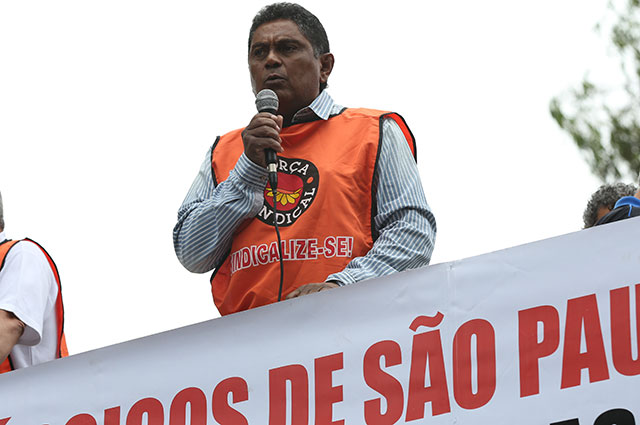The Centro de Memória Sindical (Trade Union Memory Center) is a Brazilian inter-union institution organized in order to preserve the memory of workers, their life stories and its intersection with union struggle. Founded in 1980, when Brazil was still under a military dictatorship and unionized workers were conscient about their role in fighting for both better work and payment conditions and democracy, a group of journalists had the idea of recording their testimonies about the strikes that took place in the metropolitan region of São Paulo from 1978 to 1980. Although academic researchers played important roles in the project, the board of presidents is constituted by representatives of affiliated unions. The CMS collection houses historical documents about clashes, strikes, achievements, union campaign propaganda and oral history testimonies, in addition to offering seminars and producing specialized literature.
For this week’s assignment, I watched the testimony of Geraldino dos Santos Silva, interviewed by Carolina Marina Ruy in 2015. Before talking about the interview itself, it is important to point out that CMS was very active until 1990’s and then mobilized again in 2010. Some of the OH interviews were collected by the sociologist Carmen Evangelho in the 80s, but the most recent are those from the 2010s, mediated either by the journalist Carolina Marina Ruy or the historian Maíra Estrella. The difference between them is that the first ones are accessible only through transcripts, and the second may have been recorded in video (that is the case here). Each one has their own way to publish the transcripts: Carmen does not position her questions with interrogation marks, but as reflections with three dots; she certainly does revisions to alter the interviewed speech to a formal Portuguese; and there is no proper end to the dialogue. Meanwhile, although Carolina states that there are no cuts, her voice does not appear either in the transcription or the video (in Geraldino’s testimony, her voice sounds much lower that you have to make an effort to hear), and the text form is sectioned by themes and no questions at all. Finally, Maíra does present herself as part of the first interview question, and her transcript appears to be the closest one to what usually happens.
With that being said, Geraldino worked in the metallurgical industry and, by the time of the interview, he was executive director of the Metalworkers’ Union of São Paulo and secretary of the Força Sindical Nacional. By watching his testimony, it becomes visible that they both have a good acknowledgement of each other’s work and have previously established some friendly relation that made Geraldino comfortable enough to speak his truth about being an unionized worker and militant. For a black man coming from the Nordeste region to São Paulo in 1974, he believes that his trajectory is an exception because of the acceptance in the society and the promotions he received in Probel despite being unionized. Although the testimony focuses on the Metalworkers’ Union, the one he has been affiliated with since 1979, the interviewer asks about his personal life too, promoting some personal insights about his leadership skills since the infancy. Ultimately, he reflects about how respect, sense of collectivity and mobilization shaped his experience and made others rely on him as their representative at the union, even by accessing his faults and limitations.

Useful links
Unfortunately, this interview does not have english captions, but I will take my notes to class so we can discuss more about it. Please note that CMS posted some interviews only in English and you can access it here: https://memoriasindical.com.br/category/in-english/
Interview link: https://memoriasindical.com.br/formacao-e-debate/historias-de-vida-geraldino-santos-silva-video/
CMS website link: https://memoriasindical.com.br/